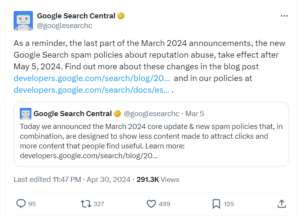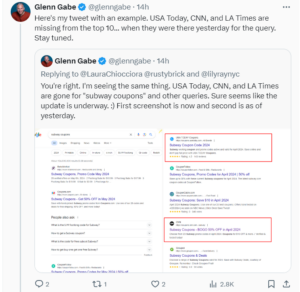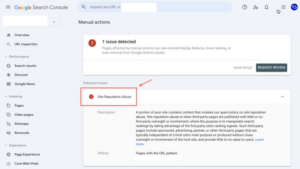Google is all set on a mission to make SERPs a clear and better place for users. It’s coming with a bang, bringing updates and allowing marketers, SEO folks, and site owners to keep up with the changing updates. Now comes the newest update, Google’s Site Reputation Abuse Policy which went live on May 5, 2024, by Google.
Surprisingly, some popular websites such as CNN, Fortune, USA Today, LA Times, Times Union, and more were hit by this update. This move is another step Google has taken to focus on high-quality and trustworthy search results for users after Google’s March core update. Curious to know what’s the recent policy is all about.
Dive in and read the article till the end!
What’s Site Reputation Abuse?
It’s just an old strategy that’s made a comeback! It’s when third-party sites publish low-quality content on another website to rank in search engines. This is simply a publisher piggybacking on other publishers rather than being user-centric.
Google Defines It As: –
Google, the ultimate game-changer, defines site reputation as ” when third-party pages that are published with little or no first-party oversight or involvement, where the aim is only to manipulate Search rankings, will be considered spam.”
“These third-party pages mainly include advertising, sponsored, or other third-party pages that are independent of the hosted site’s main purpose or produced without close oversight or involvement of the host site and offer little to no value to users,” states HRIS Nelson, a Search Quality team member at Google.
You can check out more about the site’s reputation abuse policy here.
Note: *Google also mentioned that not all the third-party content will be put into spam*
For example, many publications host advertising content that is aimed at their regular readers instead of manipulating Search rankings.
The Reminder
Here’s what Google reminded on Google Search Central about the Site reputation abuse policy coming into effect on May 5. So, Google did send an alert to the website owners!
Only Manual Actions for Now
Google kicked off the manual actions starting on May 5, 2024.
“We are only doing manual actions right now. The algorithmic will come, as stated, but they’re not live as of now, “said Sullivan from Google.
Manual actions mean the impacted sites would have received a notification in the Search Console. The realm has begun! That said, big sites such as CNN, LA Times, USA Today, and more, with their coupon directories, have stopped ranking for coupon-related keyword phrases. That’s removed from the search index.
Well, many people are sharing screenshots of their sites hit hard by the enforcement of site reputation abuse. Check them out below.
An SEO consultant, Glenn Gabe, shares how the search query for “subway coupon code” has been lost from the top 10 SERPs.
If your site is enforced according to the new policy, the official message will appear in the Search Console as follows.
Some Examples of Site Reputation Abuse
A medical site hosts a third-party page, “best books,” that is intended to manipulate search rankings with little or no involvement from the medical site.
A news site is hosting a coupon offered by a third party with little to no guidance or involvement from the hosting site. The whole and sole purpose is to manipulate the search rankings.
A casual movie review site publishes third-party pages on topics that are meant to be of no value to the audience.
An educational site publishes loan reviews written by a third party, which distributes the same page to other websites to manipulate search rankings.
Note: There’s a good suggestion: If your site falls into one of these categories or has received the manual action, Google recommends removing third-party content from search indexing.
Over to You!
The Site reputation abuse is nothing but “Parasite SEO” in the language of SEOs out there. Google aims to reduce the spread of false information and enhance the reliability of search results.
This way, users will receive accurate and trustworthy information on their screen. There’s a plug-and-playground to abide by Google’s algorithms and policies and take those giant leaps in SERPs. So, make sure you follow all the good practices when dealing in the SEO world!
All the luck your way!
Recommended For You:
Google’s March Core Update 2024: Wrapped Up on 19th April
Google Search Core Update 2024 Taking a Dig at ‘Unhelpful’ and ‘Spammy’ Content
The Hard Hit on AI Content: Checking Out on Google Manual Action Update





